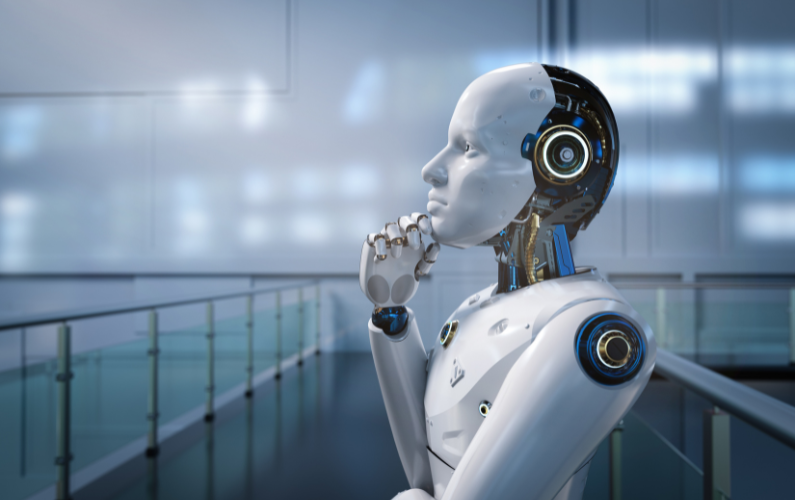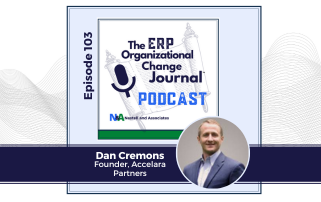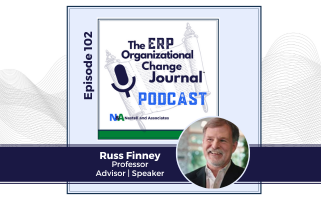Artificial intelligence is setting the stage for the next wave of enterprise resource planning systems
Article Contents
- The Value of ERP Collaborative Learning
- What is Artificial Intelligence?
- What is Enterprise Resource Planning (ERP)?
- Understanding AI’s Impact on ERP
- A Glimpse into The ERP Future
- The AI and ERP Synergy
- AI Applications in ERP: Advanced Business Intelligence
- Challenges and Opportunities of AI Integration into ERP
- Looking Ahead: The Future of AI an ERP Integration
- The Future of ERP: Artificial Intelligence
A Review of ERP AI Literature
In our forthcoming articles, we’ll delve deeper into this intersection of ERP and AI, exploring topics like predictive analysis, revenue projections, business intelligence, and the pivotal role of Natural Language Processing. Join us on this journey as we unravel the future of ERP in the age of artificial intelligence, charting new paths toward organizational efficiency and innovation. In this article, we recap “Effective usage of artificial intelligence in enterprise resource planning applications.” (Kunduru, A. R. (2023). Effective usage of artificial intelligence in enterprise resource planning applications. International Journal of Computer Trends and Technology, 71(4), 73-80.)
The Value of ERP Collaborative Learning
Nestell & Associates appreciates the value of ERP (Enterprise Resource Planning) organizational change research for several reasons: insight into best practices, exploring risk mitigation techniques, enhanced project management insights, keys to optimized business processes, further understanding of employee adoption and satisfaction, and more. Overall, by leveraging ERP organizational change research, organizations can better prepare for ERP implementation and ultimately drive business value and success. In the ever-evolving landscape of organizational change, where ERP systems play a pivotal role, Nestell & Associates stands as the vanguard of research and implementation innovation. As leaders in ERP organizational change research, we’re excited to present an upcoming series of articles, piercing into the future of ERP and artificial intelligence (AI). We will take a look at some of the specific work being examined in terms of artificial intelligence and the role this technology will play in future ERP systems.
What is Artificial Intelligence?
Artificial Intelligence (AI) refers to the simulation of human intelligence processes by machines, especially computer systems. These processes include learning (the acquisition of information and rules for using that information), reasoning (using rules to reach approximate or definite conclusions), and self-correction. AI systems are designed to perform tasks that would normally require human intelligence, such as visual perception, speech recognition, decision-making, and language translation. AI can be categorized into two broad types:
Narrow AI (Weak AI): This type of AI is designed to perform a narrow task or a specific set of tasks. Examples include virtual assistants like Siri or Alexa, recommendation systems like those used by Netflix or Amazon.
General AI (Strong AI): This type of AI would have the ability to understand, learn, and apply knowledge across different domains, similar to human intelligence. General AI remains hypothetical, highly discussed and debated, and is the subject of ongoing research.
AI techniques include machine learning, where algorithms are trained on large datasets to recognize patterns and make predictions, and deep learning, which involves neural networks with many layers capable of learning from large amounts of data. Other AI approaches include natural language processing, expert systems, and evolutionary algorithms. AI is being increasingly integrated into various industries and applications, revolutionizing fields such as healthcare, finance, transportation, and entertainment.
What is Enterprise Resource Planning (ERP)?
Enterprise Resource Planning (ERP) is a software system that integrates core business processes and functions into a single platform, facilitating the automation and streamlining of operations across an organization.
- ERP systems are designed to manage various aspects of a business, including: Finance and Accounting, Human Resources (HR), Supply Chain Management (SCM), Customer Relationship Management (CRM), Manufacturing, and Project Management.
- ERP systems offer several benefits to organizations, including: streamlined operations, improved efficiency, better decision making, and cost savings.
Popular ERP vendors include SAP, Oracle, Microsoft Dynamics, and Infor, among others. Organizations often customize ERP systems to fit their specific business needs and workflows, either through configuration options provided by the vendor or through custom development.
Understanding AI’s Impact on ERP
In the realm of modern business, the integration of artificial intelligence (AI) has emerged as a transformative force, reshaping traditional paradigms and redefining operational efficiency.
As industries navigate this technological revolution, understanding the intricate interplay between AI and enterprise resource planning (ERP) systems becomes paramount. At its core, AI represents the culmination of decades of research aimed at imbuing machines with cognitive capabilities akin to human intelligence. From deciphering complex data patterns to simulating human-like interactions, AI spans a broad spectrum of applications across diverse sectors, with ERP being no exception. The convergence of AI and ERP signifies a paradigm shift in how businesses manage their resources, streamline operations, and drive decision-making processes.
Through the lens of this transformative alliance between ERP and AI, Nestell & Associates will be examining, and sharing, the multifaceted landscape of AI within the realm of ERP, offering insights into its diverse applications and profound implications for business operations.
A Glimpse into The ERP Future
Imagine a scenario where organizational managers seamlessly interact with their ERP systems, leveraging the power of AI-driven chatbots. Through Natural Language Programming (NLP) interfaces meticulously fine-tuned by our experts, managers will find themselves communicating with these bots in a manner akin to conversing with a trusted colleague. Freed from the technical intricacies of data retrieval, they can focus their attention squarely on analysis and decision-making. For firms in sectors like industrial manufacturing, where commodity price fluctuations pose significant challenges, AI emerges as a game-changer. By harnessing AI’s predictive capabilities, these enterprises gain invaluable insights into future price trends of raw materials. Armed with this knowledge, they can devise robust hedging strategies, mitigating the adverse impacts of market volatility on their earnings. But AI’s influence extends far beyond financial forecasting. From tracking consumer behavior to automating feedback generation in online shopping experiences, its applications are vast and transformative. In the realm of ERP, however, the integration of AI remains relatively nascent. While options for AI-enabled ERP software are limited today, ongoing research promises exciting possibilities.
The AI and ERP Synergy
Kunduru, A. R. (2023) discusses how at the heart of this synergy lies the promise of enhanced efficiency and efficacy in resource management. ERP systems, designed to integrate core business processes such as finance, production, and supply chain management, stand to benefit significantly from the integration of AI-driven functionalities. The symbiotic relationship between AI and ERP is evident across various domains, from customer service automation and predictive analysis to inventory management and sales automation. Through AI-powered chatbots and natural language processing (NLP) interfaces, ERP systems can now engage with users in a more intuitive and efficient manner, freeing up valuable time for decision-makers to focus on strategic initiatives.
AI Applications in ERP: Advanced Business Intelligence
The transformative potential of AI within ERP extends far beyond mere automation, encompassing a spectrum of advanced functionalities aimed at optimizing business processes and driving informed decision-making. Kunduru, A. R. (2023) further describes that sales automation, for instance, leverages narrow AI algorithms to analyze market trends, consumer behavior, and pricing dynamics, empowering organizations to make data-driven decisions and maximize sales opportunities. Similarly, inventory management benefits from AI-driven predictive analytics, enabling proactive inventory optimization and demand forecasting. Moreover, AI’s integration into manufacturing processes facilitates enhanced product design, quality assessment, and supply chain optimization, ushering in a new era of efficiency and innovation across the manufacturing landscape. By harnessing the power of AI-driven data mining and advanced analytics, businesses can unlock valuable insights, mitigate risks, and capitalize on emerging opportunities.

Embracing AI-powered ERP solutions comes with challenges and unprecedented opportunities for innovation and growth.
Challenges and Opportunities of AI Integration into ERP
Kunduru, A. R. (2023) further shares that while the integration of AI into ERP holds immense promise, it also presents a unique set of challenges. From data compatibility issues and integration complexities to concerns regarding data privacy and security, organizations must navigate a myriad of obstacles on the path to AI-driven transformation. However, with these challenges come unprecedented opportunities for innovation and growth. By embracing AI-powered ERP solutions, businesses can enhance their competitive advantage, drive operational excellence, and unlock new avenues for value creation.
Looking Ahead: The Future of AI and ERP Integration
As we stand on the cusp of a new era defined by AI-driven innovation, Kunduru, A. R. (2023) describes that the future of ERP holds boundless possibilities. From predictive analytics and revenue projections to business intelligence and natural language processing, the journey ahead promises to be both exciting and transformative. The integration of AI into ERP represents a paradigm shift in how businesses operate and innovate. By harnessing the power of AI-driven technologies, organizations can unlock new levels of efficiency, agility, and competitiveness in an increasingly dynamic business landscape.
The Future of ERP: Artificial Intelligence
As we embark on this journey of discovery and innovation, one thing remains clear: the future of ERP is intrinsically linked to the evolution of artificial intelligence.
Nestell & Associates is here to be your guide on the future of ERP and its impact and value on your organization. Join us as we share research, and discuss and answer questions on topics such as:
- Ethical Implications of AI in ERP
- Impact on Job Market: With the integration of AI and automation in ERP systems, what will be the impact on the job market? Will it lead to job displacement or create new opportunities for employment? How can companies ensure a smooth transition for their employees?
- Security Concerns: How can AI-powered ERP systems mitigate cybersecurity risks? What measures need to be in place to protect sensitive business data from potential breaches or attacks?
- Interoperability and Standardization: Given the diverse range of ERP systems and vendors, how can AI integration be standardized to ensure interoperability across different platforms? What challenges might arise in achieving this standardization?
- Regulatory Framework: Should there be specific regulations or guidelines governing the use of AI in ERP systems? How can regulatory bodies ensure that AI-powered ERP implementations comply with existing laws and regulations, such as data protection laws?
- User Acceptance and Training: How can companies ensure user acceptance of AI-powered ERP systems among employees? What training and support mechanisms need to be in place to facilitate the adoption of these technologies?
- Cost-Benefit Analysis: What are the costs associated with implementing AI in ERP systems, and how do they compare to the potential benefits in terms of efficiency gains, cost savings, and improved decision-making capabilities?
- Human vs. Machine Decision-Making: To what extent should AI be relied upon for decision-making in ERP systems? How can a balance be struck between human judgment and machine-driven insights to optimize business outcomes?
- Future Trends and Developments: What are some emerging trends and technologies in the field of AI and ERP integration? How might these developments shape the future of business operations and enterprise management?
The Future of ERP and AI Integration
In Summary, as we’ve explored throughout this article, the intersection of Artificial Intelligence (AI) and Enterprise Resource Planning (ERP) systems represents a pivotal shift in the business landscape. Nestell & Associates stands at the forefront of this transformation, showcasing the vast potential of AI to enhance ERP functionalities — from process optimization to a complete redefinition of decision-making and operational efficiencies.
While the path forward presents its set of challenges, including concerns around data privacy and the complexities of system integration, the opportunities it heralds are unparalleled. Embracing AI-driven ERP solutions opens the door to significant innovation and growth, enabling businesses to surpass traditional operational limits.
As AI technology continues to advance and integrate more deeply with ERP systems, we stand on the cusp of a new era. This era promises not just enhanced business competitiveness and agility but also a reimagined approach to strategic planning and insights. The symbiotic relationship between ERP and AI not only aims to transform the technological infrastructure of businesses but also to redefine the value creation model in the digital age.
Join us as we venture further into this promising frontier, addressing the ethical, operational, and strategic questions that accompany the integration of AI in ERP systems. The journey into the future of ERP, closely intertwined with the evolution of artificial intelligence, is not just about technological advancement but about charting new paths to success in an increasingly dynamic business environment.
Dr. Jack G. Nestell
Article References
Kunduru, A. R. (2023). Effective Usage of Artificial Intelligence in Enterprise Resource Planning Applications. International Journal of Computer Trends and Technology, 71(4), 73-80. Available at: https://d1wqtxts1xzle7.cloudfront.net/102928816/IJCTT_V71I4P109-libre.pdf
Dive Deeper into AI and ERP Research with Nestell & Associates
If you’re captivated by the potential of AI in enhancing ERP systems and keen on exploring the latest research, we’re eager to connect. Nestell & Associates is committed to advancing the field through collaboration and innovation. Whether you’re looking to contribute to the research or seeking insights for your own project, let’s start a conversation.
You might like these related articles:
What do ERP Critical Success Factors and Artificial Neural Networks have in Common?
Artificial Intelligence and the Future of ERP Organizational Change
Intelligent ERP Systems: Artificial Intelligence and Its Impact on ERP Organizational Change
Machine Learning in ERP: Envisioning the Future of Business Performance
Related Episodes from “The ERP Organizational Change Journal” Podcast:
Episode 38: How Artificial Intelligence is Transforming the ERP Systems
Latest Podcast Episodes – “The ERP Organizational Change Journal”
Human Capital in PE-Backed Companies: Strategies for Leadership and Talent Management
Human Capital in PE-Backed Companies: Strategies for Leadership and Talent ManagementEpisode Overview - PE-backed Human Capital Strategies Today’s episode centers on the pivotal role of human capital in PE-backed companies, emphasizing how strategic leadership and...
ERP Organizational Change: Technology Strategy
ERP Organizational Change: Technology Strategy and Keys to SuccessEpisode Overview - Technology Strategy In general, at the highest level of categorization, there seems to be consensus on the importance of people and culture, informational technology, and project...
AI and Private Equity Synergy: Fueling Business Transformation
AI and Private Equity Synergy: Fueling Business TransformationEpisode Overview - AI in PE Strategies In this episode, we explore how AI and Private Equity synergies are fueling business transformations and reshaping investment strategies and operational efficiencies....
About Nestell & Associates
Where People, Processes, and Technology Align
Nestell & Associates specializes in providing M&A ERP and IT consulting services for private equity firms and their portfolio companies. We offer a range of vendor-neutral services to support all stages of the investment cycle.
Moreover, we know how to effectively minimize or eliminate the issues you experience during M&A. With Private Equity Technology Solutions as 100% of our business, we bring a unique approach to ERP that other firms can’t compete with.




